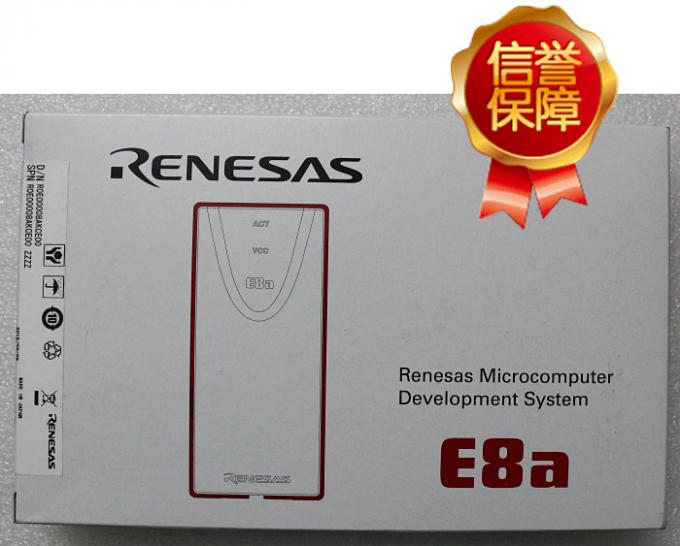The E8a on-chip debugging emulator is a development of the E8, maintaining the same functionality and ease of use whilst reducing both cost to the end user and the size of the unit.
The E8a is designed to be used both as an on-chip debugger for R8C Family, M16C Family, H8 Family H8/Tiny and Super Low Power Series, and 740 Family in conjunction with Renesas High-performance Embedded workshop, providing the user with a range of debugging features as well as a handy device programmer. E8a is ideal for the modern development and prototyping environment with programming support for devices from all the main MCU families.
The product is supplied with USB host interface cable, a user interface cable, the E8a itself and a software pack containing High-performance Embedded Workshop, Flash Development Toolkit, debugger support software for the E8a and evaluation versions of the Renesas compiler toolchains. Supported versions of the toolchains are available from your Renesas supplier.
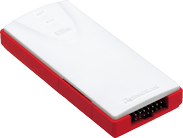
Release Information
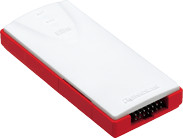
The Emulator Software for the E8a Emulator
Features
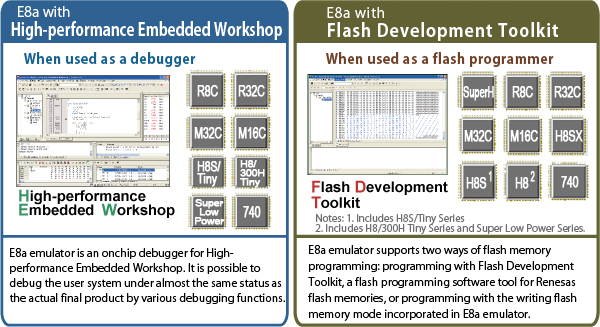
Ultra-compact dimensions
92 mm × 42 mm × 15 mm
Biodegradable material
E8a's plastic case is made from a biodegradable material. (a vegetable-based polylactide [PLA])
Complete debug functions
- Real-time emulation possible even at highest CPU operating frequency. Ample built-in Break and Trace functions for Tiny MCU System developments.
- Memory expansion mode is supported. (Device Permitting)
- See Specifications for further details.
Close to target system actual evaluation
The user system can be debugged in conditions as close as possible to the end-product.
Superior capabilities
The debugger ensures high-efficiency debugging with a dedicated window for setting Break-points and Break conditions, trace data window display and command line functions. High-speed downloading of a load-module file also supported.
High-performance Embedded Workshop (Renesas IDE) offers seamless support for system development
The High-performance Embedded Workshop IDE brings the debugger component, compiler toolchain and some FLASH programming capability together within a single application environment, there is no need to keep launching different applications - the IDE takes care of it all.
USB bus-powered: no external power supply required
The host PC supplies power to the E8a via the USB bus meaning no external power supply is necessary. Use it anywhere, anytime. Power can also be supplied on to the user system from the E8a emulator.
On-board programming
The E8a can be used as a FLASH memory programming interface in conjunction with the Flash Development Toolkit.
E7/E8 compatibility means smooth environment migration
No special adjustments are necessary to connect to any system designed to connect to the predecessor E8 or ancestor E7 debug modules, the E8a will slot directly into such designs, an example of this is the Renesas Starter Kits (RSK) which will work just as well with E8a as with an E8.
Functions
On-chip Debugging Features
- Used as an on-chip debugger, the E8a utilizes the on-chip functions built into the device and allows the user to perform complete system debug, from MCU operations to electrical characteristics.
- The Renesas integrated development environment "High-performance Embedded Workshop" provides the user with a common GUI front end, it supports both the debugger functionality of E8a and a variety of development software tools, such as the C compiler and simulators. The result is a seamless toolchain enabling highly efficient program development from coding to building and debugging.
- E8a product is ready for system development and debugging the minute it reaches the user, the software package includes evaluation versions of cross tools for immediate connection and all necessary cables to enable connection to the target system are included.
Flash Memory Programming Features
- The E8a supports flash memory programming of the Renesas microcontrollers using the Flash Development Toolkit, enabling the user to program the devices using the E8a as a hardware interface.
- The High-performance Embedded Workshop includes a function that allows quick programming of the flash memory in the R8C, M16C, and H8 family microcontrollers; this can be useful when building and debugging code.
START/STOP Function
- This emulator has the START/STOP function so that it is available to execute the designated routine of the user's program, immediately before starting the user's program execution or immediately after stopping the execution. Therefore you can interrupt the function you would like to halt during debugging and also resume it.
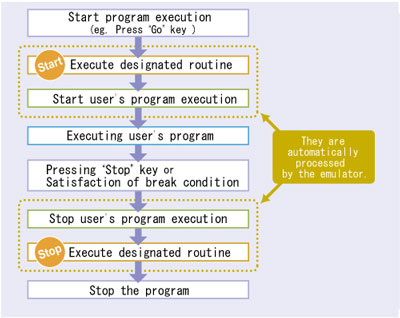
How to program
- The following two programming methods are available.
- Using the Flash Development Toolkit (Flash programming tool for Renesas flash memories)
- Using the "Writing Flash Memory" mode of the E8a emulator
Supported MCUs are the same as those enable on-chip debug features.
Specifications
| Emulator Part. No. |
R0E00008AKCE00 |
| MCU supported mode |
R32C/100 Series
M32C/80 Series
M16C/60 Series
M16C/30 Series |
Single-chip mode
Memory expansion mode
(Limited by the MCU modes supported by the target MCU.) |
| Other MCUs |
Single-chip mode |
| Debugging function |
Refer to On-chip Debuggers Performance Property. |
| Flash memory programming function |
Enable |
| Operating Environment |
Refer to Operating Environments of Products. |
| Emulator power supply |
Not required (USB bus-powered from PC) |
User interface
(between emulator and target) |
14-pin connector [Product Type 2514-6002: 3M
(Minnesota Mining and Manufacturing Company)]
*Same as E7, E8 Emulator
*14-pin connector [Product Type 2514-6002: 3M] is not included. |
| Target power supply |
Target board can draw 3.3V or 5.0V power (Max: 300mA) from Emulator |
| Operating environment conditions |
[Temperature] : 10-35 ºC
[Humidity] : 30-85%RH (no condensation, no corrosive gas)
[Dirt/Dust] : general office conditions |
| Storage environment conditions |
[Temperature] : -10-50 ºC
[Humidity] : 30-85%RH (no condensation, no corrosive gas)
[Dirt/Dust] : general office conditions |
| Size (Emulator unit) |
92mm x 42mm x 15mm |
| Overseas standard |
European Standards: EN 55022 Class A, EN 55024
US FCC Standard: FCC part 15 Class A |
Components
- E8a emulator
- USB-interface cable
- User-interface cable
- CD-ROM bundled with following software
- High-performance Embedded Workshop
- M16C E8a emulator debugger
- M32C E8a emulator debugger
- R32C E8a emulator debugger
- R8C E8a emulator debugger
- H8S/Tiny E8a emulator debugger
- H8 Tiny/Super Low Power E8a emulator debugger
- 740 E8a emulator debugger
- free-of-charge evaluation version of C Compiler Package for R32C Series Note1
- free-of-charge evaluation version of C Compiler for M32C Series [M3T-NC308WA] Note1
- free-of-charge evaluation version of C/C++ Compiler Package for the M16C Series and the R8C Family [M3T-NC30WA] Note1
- free-of-charge evaluation version of C/C++ Compiler Package for the H8SX, H8S, and H8 Families Note1
- free-of-charge evaluation version of Assembler for 740 Family [M3T-SRA74] Note1
- free-of-charge evaluation version of Flash Development Toolkit Note1
Note
- It might not be up to date because emulator software is revised after compilers' revision. Visit here and download the latest evaluation software.
Optional Products
The following products are also available for the E8a.
Conversion Adapter
| Product name and Orderable part number |
Overview |
Small Connector Conversion Adapter for the E1 Emulator
R0E000010CKZ11 |
A conversion adapter that converts the standard 14-pin/2.54mm pitch connector for the E1 emulator to the 14-pin/1.27mm pitch connector to reduce connector space on the board. |
Isolator
| Product name and Orderable part number |
Overview |
Isolator for the E1 Emulator
R0E000010ACB10 |
Enables debugging in an environment where there is a difference in potential between the user system GND and the host PC GND. |
System Configuration
Shown here is a representation of the debugging system configuration, the E8a package contains everything the user needs to connect the host PC with the target and start debugging the target.
To know the programming system configuration, please refer to the Flash Development Toolkit site.

*: When you use the E8a emulator with the board currently used for the M3A-0665 FoUSB, please use the E8 14PIN-10PIN Convert Board.
Target Devices
Target Decives for E8a (Feb 05, 2013)
- When using as a debugger
- When using as a flash programmer
